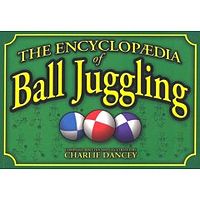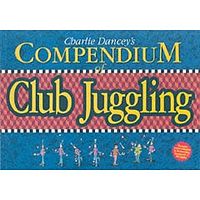- The Encyclopædia of Ball Juggling
-
The Encyclopædia of Ball Juggling 
2003 Edition CoverAuthor(s) Charlie Dancey Illustrator Charlie Dancey Country United Kingdom Language English Genre(s) Encyclopaedia Publisher Butterfingers Publication date 1994 Media type Print (Paperback) ISBN 1-898591-13-X OCLC Number 222693877 Followed by The Compendium of Club Juggling Charlie Dancey's Compendium of Club Juggling 
First Edition CoverAuthor(s) Charlie Dancey Illustrator Charlie Dancey Country United Kingdom Language English Genre(s) Encyclopaedia Publisher Butterfingers Publication date 1995 Media type Print (Paperback) ISBN 1-898591-14-8 Preceded by The Encyclopædia of Ball Juggling The Encyclopædia of Ball Juggling (formerly Charlie Dancey's Encyclopædia of Ball Juggling) is a book authored by the professional juggler Charlie Dancey and first published in 1994. Revised and reprinted twice since, first in 1997 and again in 2003, it has remained a favourite among the juggling community ever since, attracting virtually unanimously positive critical[1] and public reviews.[2][3]
Many attributed the book's popularity to the A to Z indexing of content throughout its pages and complete cross-referencing of articles.[4] Further to this, Dancey's light-hearted yet informative writing style complemented by his distinctive, often humorous, cartoon illustrations ensured the book's success, earning it the nickname of the "juggling bible" among many of its readers.[3][4]
Contents
Content
The book is intended to be for all jugglers to enjoy (something Dancey explains on the first page introduction) and lists articles containing advice on juggling patterns suitable for a total beginner, such as Three Ball Cascade, for more advanced jugglers (e.g. Burke's Barrage) and also for experts (e.g. Five Ball Mills Mess) as well as entries on various types of juggling, different types of notation and seemingly random articles such as the entry on aardvarks. The book concludes with a short story about the philosophy of juggling entitled Zen and the Perfect Juggler.
The encyclopaedia contains approximately 220 pages in total, with each page in the main alphabetical section (excluding the introduction, acknowledgements, appendices and covers) in landscape orientation and formatted into three broad columns. Virtually every page of the book contains a cartoon or diagram by Dancey, which may or may not extend beyond the boundaries of a column of text. For example, the complete version of the illustration below takes up the lower portion of a complete double-page spread for the article about the pattern Mills Mess.
The landscape layout of each page and the binding along the left (shorter) side of the pages was deliberately put in place to emphasise that it is meant not to be a book to be read whilst sitting down, but a book to "stand up and do".[5]
 The juggling pattern Mills Mess as illustrated by Dancey on the cover of the 1997 edition
The juggling pattern Mills Mess as illustrated by Dancey on the cover of the 1997 editionIntroduction
The first page of content has two columns: first, an introduction where Dancey explains his reasons for writing the book and what it is about before writing a little about that particular edition; the second column is headed How to read this book and details aspects on the alphabetical listing and cross-referencing, such as the fact that when another article is referenced it is printed in bold type.
Overleaf are the author's acknowledgements to various contributors and family, including a nod to Haggis McLeod, Dancey's juggling partner since 1984 as part of the comedy juggling act Haggis and Charlie. There then follows a contents page, listing the page number of every article. Finally, before the title page and first article, there is a whole side containing an M. C. Escher-like tessellation pattern of the book's cartoon mascot "Man in the Hat".
Specialisation
Although billed as an encyclopaedia of ball juggling, the book has a very strong bias towards the art of toss juggling[6], that is to say where items (e.g. beanbags or balls) are thrown and caught in various ways and patterns. This includes the variant toss juggling known as bounce juggling where items are thrown, bounced off a surface and caught and can be equivalently notated using Siteswap or ladder notation also outlined in the encyclopaedia.
However, there is only scant reference to contact juggling, where items are manipulated without being thrown, and floor juggling.
Furthermore, although discussed infrequently throughout the book, there is little extrapolation of the patterns mentioned for balls (or similar items which can be thrown without spin/orientation being a concern) to clubs, rings or other objects. It would not be until fourteen months later, with the publication of Charlie Dancey's Compendium of Club Juggling that these areas would be explored to a greater extent.
Dancey's Devilment
One particularly infamous article within The Encyclopædia of Ball Juggling is that of Dancey's Devilment, a trick named eponymously by the author which he describes as "a mythical pattern of brain-bending proportions. It came to me in a dream but the memory of just precisely what it was faded infuriatingly as I woke in the morning." Dancey goes on to describe its similarity to a four-ball Rubenstein's Revenge with the addition of multiplex throws.
Fans of the book have gone on to interpret the description as a real pattern with corresponding SiteSwap notation[7], something which Dancey himself comments on in the 2003 edition. Some realisations have been posted on the internet in the form of video[citation needed] or using the Java JuggleAnim applet, one example of which can be found here.
Differences between editions
The 1997 revised edition made little change to the original core alphabetical section apart from the fixing of a few minor glitches, though the ending to the story Zen and the Perfect Juggler was subtly changed. In addition to this, new appendices were published dealing primarily with juggling theory.
Though Dancey had previously discussed siteswap and ladder notation to some degree in the 1997 edition, new articles about causal diagrams and mills mess state transition diagrams were added, as well as instruction on their application to existing juggling patterns.
The 2003 edition incorporates these notations and their appendices into the main body of the encyclopaedia. As a result the SiteSwap Feast, a computer-generated list of non-redundant workable siteswap sequences between 0 and 99,999, was dropped since "Siteswap State Tables now do the same job a lot more efficiently"[8].
The 2003 edition added new articles and further material to existing ones. In one case, the world-record breaking juggler Luke Burrage persuaded Dancey to include an article on squeezes (the opposite of multiplexes).[9]
The 2003 edition has a new cover, and added cross-references to The Compendium of Club Juggling
The Compendium of Club Juggling
Following the success of The Encyclopædia of Ball Juggling, Dancey was able to write and have published in 1995 (also by Butterfingers) a companion book entitled Charlie Dancey's Compendium of Club Juggling which also took on a collated encyclopaedic format but this time on the specific subject of club juggling. This second book was slightly thicker than its predecessor, largely owing to the increased emphasis on passing patterns. Some intricate solo patterns such as the Boston Mess described in the Encyclopaedia were left out of the Compendium.
The Compendium of Club Juggling from its first edition also had considerable cross-referencing among not only its own pages but also those of its companion book. Later, revised editions of The Encyclopædia of Ball Juggling would also take on this approach.
The last entry in this book was once again a humorous short story regarding the philosophy of juggling, this time entitled Zenith and the Art of Pattern Maintenance.
Notes
- ^ Instructional Books
- ^ IJDb Juggling Shop - Charlie Dancey's Encyclopædia Of Ball Juggling
- ^ a b Ball Juggling Encyclopaedia - Books - JugglingStore.com
- ^ a b Amazon.co.uk: Charlie Dancey's Encyclopaedia of Ball Juggling: Books: Charlie Dancey
- ^ Charlie Dancey's Encyclopædia of Ball Juggling (second edition), How to read this book
- ^ Charlie Dancey's Encyclopædia of Ball Juggling (second edition), article on Toss Juggling
- ^ http://www.jugglingdb.com/jugglewiki/index.php/DanceysDevilment
- ^ Charlie Dancey's Encyclopædia of Ball Juggling (third edition), Changes to this edition
- ^ http://www.jugglingdb.com/news/rightpane.php?group=1&original=90799
See also
- Charlie Dancey
- Juggling balls
External links
Categories:- Toss juggling
- Juggling
- Handbooks and manuals
- Specialized encyclopedias
- Books about sports
Wikimedia Foundation. 2010.
